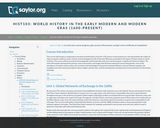
This course will present a comparative overview of world history from the 17th century to the present era. The student will examine the origins of major economic, political, social, cultural, and technological trends of the past 400 years and explore the impact of these trends on world societies. Upon successful completion of this course, students will be able to: Think critically about world history in the early modern and modern eras; Assess how global trade networks shaped the economic development of Asia, Europe, and the Americas in the 17th and 18th centuries; Identify the origins of the Reformation and Counter-Reformation in Europe and assess the social and political consequences of these movements for the peoples of Europe; Identify the origins of the Enlightenment in Europe and assess how Enlightenment ideas led to political and social revolutions in Europe and the Americas; Identify the origins of the Scientific and Industrial Revolutions in Europe and assess how these intellectual and economic movements altered social, political, and economic life across the globe in the 18th and 19th centuries; Compare and contrast how European imperialism affected the states and peoples of Asia, Africa, and the Americas in the 19th century; Identify the origins of World War I and analyze how the war's outcome altered economic and political balances of power throughout the world; Identify the origins of totalitarian political movements across the globe in the 1920s and 1930s and assess how these movements led to World War II; Analyze how World War II reshaped power balances throughout the world and led to the emergence of the United States and the Soviet Union as global superpowers; Assess how decolonization movements in the 1950s and 1960s altered political, economic, and social relationships between the United States, the nations of Europe, and developing countries throughout the world; Assess how the end of the Cold War led to political and economic realignments throughout the world and encouraged the growth of new global markets and systems of trade and information exchange; Analyze and interpret primary source documents from the 17th century through the present, using historical research methods. (History 103)
- Subject:
- History
- Material Type:
- Assessment
- Full Course
- Lecture
- Lecture Notes
- Reading
- Syllabus
- Textbook
- Provider:
- The Saylor Foundation
- Date Added:
- 06/29/2018
